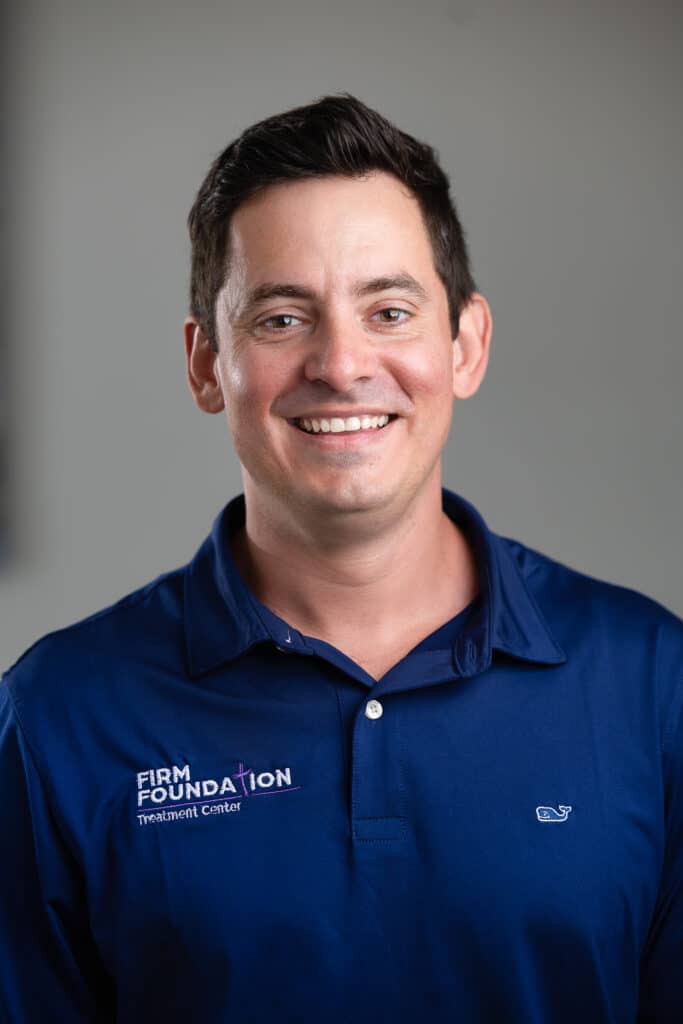Understanding Benzodiazepine Addiction in Woodstock, GA
Benzodiazepines, commonly prescribed to treat anxiety, insomnia, and seizures, are highly addictive medications that can lead to dependency if not used correctly. In Woodstock, GA, many men find themselves struggling with benzodiazepine addiction after initially using these drugs for legitimate medical purposes. Over time, the body becomes dependent on the sedative effects of benzodiazepines, making it difficult to stop without professional help.
At Firm Foundation Treatment Center, we provide comprehensive, Christ-centered care for men dealing with benzodiazepine addiction. Our evidence-based therapies, combined with spiritual guidance, help individuals overcome both physical dependence and the psychological need for these drugs.
What is Benzodiazepine Addiction? Symptoms, Risks, and Consequences
Benzodiazepine addiction occurs when an individual becomes dependent on these medications, unable to function without them. What starts as a prescription for anxiety or sleep disorders can quickly turn into a dangerous addiction that affects every aspect of life. Common benzodiazepines include Xanax, Valium, Klonopin, and Ativan.
Common Signs of Benzodiazepine Addiction:
- Developing a tolerance and needing higher doses to achieve the same effects.
- Experiencing withdrawal symptoms such as agitation, tremors, or seizures when attempting to stop.
- Doctor shopping or seeking multiple prescriptions to maintain access to benzodiazepines.
- Difficulty concentrating or performing daily tasks without using the drug.
- Continuing to use benzodiazepines despite knowing the negative consequences.
The Risks of Long-Term Use:
Long-term benzodiazepine use can lead to serious health problems, including cognitive decline, memory issues, and increased risk of accidents due to impaired coordination and judgment. In some cases, abrupt withdrawal from benzodiazepines can be life-threatening, making medically supervised detox essential.
Benzodiazepine Addiction and Mental Health in Woodstock
Men in Woodstock often face the dual challenge of benzodiazepine addiction and co-occurring mental health disorders, such as anxiety, depression, or trauma. Many who are prescribed benzodiazepines for anxiety or sleep issues end up relying on the drug as a way to cope with daily stress, ultimately leading to addiction.
Mental Health Conditions Commonly Associated with Benzodiazepine Use:
- Anxiety: While benzodiazepines are effective for short-term relief, long-term use can worsen anxiety symptoms.
- Depression: Many men in Woodstock struggling with benzodiazepine addiction also experience depression, either as a result of the drug’s sedative effects or as a co-occurring disorder.
- Post-Traumatic Stress Disorder (PTSD): Benzodiazepines are often prescribed to men with PTSD, but overuse can make it difficult to address the underlying trauma, leading to increased dependence on the drug.
At Firm Foundation Treatment Center, we address these co-occurring conditions through a combination of therapy and spiritual guidance, helping clients break free from the cycle of addiction and mental health struggles.
Our Christ-Centered, Evidence-Based Approach to Benzodiazepine Addiction
Firm Foundation’s approach to benzodiazepine addiction treatment integrates evidence-based therapies with a strong focus on faith. We believe that true recovery requires healing not only of the body and mind but also of the soul. Our programs are designed to support men in reconnecting with their faith while learning the tools necessary for long-term sobriety.
Treatment Modalities We Use:
- Cognitive Behavioral Therapy (CBT): CBT helps clients identify and change the negative thought patterns that drive their benzodiazepine use. By addressing the root causes of anxiety or insomnia, clients can develop healthier ways to cope.
- Dialectical Behavior Therapy (DBT): For men who struggle with intense emotions, DBT provides skills for emotional regulation, distress tolerance, and mindfulness, helping them manage anxiety without relying on benzodiazepines.
- Motivational Interviewing (MI): This technique encourages men to explore their ambivalence toward quitting benzodiazepines and helps them find their own motivation for recovery.
- Eye Movement Desensitization and Reprocessing (EMDR): For clients dealing with trauma, EMDR allows them to process and heal from traumatic memories that may be fueling their addiction.
- Family Systems Therapy: Addiction impacts the entire family, and Family Systems Therapy helps rebuild relationships and foster understanding between clients and their loved ones.
- Art Therapy: Art Therapy offers a creative outlet for men to express their emotions and experiences, which can be particularly useful when verbal expression is difficult.
Personalized Levels of Care: PHP, IOP, and OP for Benzodiazepine Addiction Treatment
We understand that recovery is a journey, and no two men have the same needs. At Firm Foundation, we offer various levels of care to meet each client where they are in their recovery process. Our personalized approach ensures that each man receives the appropriate level of support and care, helping him achieve long-term sobriety.
Partial Hospitalization Program (PHP):
Our PHP offers intensive care for men who need daily support but do not require 24-hour residential treatment. Clients attend therapy sessions and spiritual growth activities throughout the day before returning home in the evening.
Intensive Outpatient Program (IOP):
IOP provides flexibility for men who are transitioning from PHP or residential treatment and are ready to reintegrate into daily life. Clients attend therapy sessions multiple times per week while maintaining personal responsibilities, focusing on relapse prevention and emotional regulation.
Outpatient Program (OP):
Our OP is ideal for men who are further along in their recovery journey and need less intensive support. Clients attend weekly therapy sessions and continue to receive Christ-centered guidance and support as they maintain their sobriety.
Unique Challenges Facing Men in Woodstock, GA
Woodstock, GA, is a thriving suburban community, but the pressures of balancing work, family, and personal responsibilities can be overwhelming for many men. These challenges, combined with the availability of benzodiazepine prescriptions, have contributed to an increase in substance use disorders in the area.
Challenges Specific to Woodstock:
- Work and Family Stress: Men in Woodstock often face the dual pressures of maintaining a successful career and providing for their families. Benzodiazepines may initially seem like a solution for managing anxiety or sleep issues, but over time, they can become a harmful crutch.
- Limited Local Resources: Despite Woodstock’s rapid growth, there are still limited local resources for addiction treatment, especially when it comes to addressing benzodiazepine addiction. Firm Foundation Treatment Center fills this gap by providing local, Christ-centered care.
- Cultural Stigma: In smaller, suburban communities like Woodstock, there is often a stigma associated with seeking help for addiction. Many men fear judgment from their peers and family, preventing them from reaching out for support. Our compassionate and non-judgmental environment at Firm Foundation helps men overcome this barrier.
Real Client Testimonials
“I never thought I could stop using benzodiazepines, but Firm Foundation Treatment Center gave me the tools I needed to regain control of my life. Through a combination of faith and therapy, I was able to break free from addiction and start living again.” — Mark, 40, Woodstock, GA
“The team at Firm Foundation didn’t just help me quit benzodiazepines—they helped me understand the reasons I started using them in the first place. Their Christ-centered approach was exactly what I needed to heal mentally, physically, and spiritually.” — David, 38, Cherokee County
Why Choose Firm Foundation Treatment Center?
At Firm Foundation, we combine faith and evidence-based practices to offer a holistic approach to benzodiazepine addiction treatment. Our team is committed to helping men break free from addiction and rebuild their lives through Christ-centered healing.
- Faith-Based Healing: We believe that recovery is not complete without addressing the spiritual aspect of healing. Our Christ-centered programs provide the faith-based support men need to overcome addiction.
- Comprehensive Care: From CBT to EMDR, our programs are designed to address both the addiction and the underlying mental health issues that contribute to it.
- Supportive Community: Our center fosters a sense of belonging and accountability, ensuring that clients have the support they need during and after treatment.
Take the First Step Toward Benzodiazepine Addiction Recovery in Woodstock, GA
If you or a loved one is struggling with benzodiazepine addiction in Woodstock, GA, Firm Foundation Treatment Center is here to help. Our Christ-centered, evidence-based approach can guide you through recovery, offering the tools and support you need to break free from addiction and reclaim your life.
Benzo Addiction Treatment FAQs
Which Benzodiazepine Has The Highest Risk Of Abuse?
Among benzodiazepines, Xanax (alprazolam) has the highest risk of abuse due to its rapid onset and short half-life. It produces a strong calming effect that can lead to physical dependence and addiction quickly. Other benzodiazepines such as Valium (diazepam), Ativan (lorazepam), and Klonopin (clonazepam) also carry a risk of abuse, especially when misused or taken without medical supervision. Individuals struggling with benzodiazepine addiction often require specialized addiction treatment programs, including detox and ongoing outpatient treatment, to achieve long-term recovery.
What Is Considered Outpatient Rehab?
Outpatient rehab is a form of addiction treatment that allows individuals to receive care while living at home. Outpatient treatment includes various levels of care, such as partial hospitalization programs (PHPs) and intensive outpatient programs (IOPs), depending on the severity of the substance use disorder. Outpatient rehab typically involves therapy sessions, including individual therapy, group therapy, and family therapy, to address the emotional and psychological aspects of addiction while allowing patients to maintain their daily responsibilities.
How Long Does Benzo Rebound Anxiety Last?
Benzo rebound anxiety typically lasts anywhere from a few days to a couple of weeks after discontinuing benzodiazepines. This occurs when the brain struggles to adjust after prolonged drug use, leading to heightened anxiety and withdrawal symptoms. The duration depends on the type of benzodiazepine used, the length of use, and the individual’s unique needs. Medical detox and a personalized addiction treatment plan can help manage these symptoms and prevent relapse.
Is Inpatient Rehab Better Than Outpatient?
Whether inpatient rehab or outpatient rehab is better depends on the individual’s unique situation and the severity of their substance use disorder. Inpatient rehab provides 24/7 supervision in a controlled environment, making it ideal for individuals with severe addiction or co-occurring mental health disorders. Outpatient treatment, including IOP and PHP, offers flexibility and allows individuals to continue their daily routines while attending therapy sessions. Both treatment options can lead to long-term recovery when tailored to the individual’s treatment plan.
Do You Have To Stay Overnight In Rehab?
Whether or not you have to stay overnight in rehab depends on the type of program. Inpatient rehab requires individuals to stay at the treatment facility 24/7 for the duration of the program, while outpatient rehab allows individuals to return home after their therapy sessions. For individuals with moderate to severe substance abuse, inpatient rehab may be recommended initially, followed by outpatient treatment and aftercare support.
What Are Benzodiazepines?
Benzodiazepines, commonly referred to as benzos, are prescription medications used to treat anxiety, panic disorders, insomnia, and seizures. Common benzodiazepines include Xanax, Valium, Ativan, and Klonopin. While they are effective for short-term use, prolonged use can lead to dependence, withdrawal symptoms, and addiction. Individuals struggling with benzodiazepine addiction often require specialized addiction treatment that includes medical detox, cognitive behavioral therapy (CBT), and aftercare planning.
How Does Benzo Addiction Treatment Work?
Benzo addiction treatment typically begins with medical detox to safely manage withdrawal symptoms and stabilize the individual. Following detox, patients often transition to a structured addiction treatment program that may include inpatient rehab, partial hospitalization programs (PHPs), or intensive outpatient programs (IOPs) depending on their unique needs. Treatment incorporates individual therapy, group therapy, family therapy, and evidence-based approaches such as cognitive behavioral therapy (CBT) and dialectical behavior therapy (DBT) to support long-term recovery.
Is Benzo Addiction Treatment Covered By Insurance?
Yes, most major insurance providers cover some or all aspects of benzo addiction treatment, including detox, inpatient rehab, outpatient programs, and aftercare services. Coverage depends on the individual’s insurance plan and the treatment facility’s partnership with insurance providers. It’s best to contact the rehab center or your insurance provider to verify coverage for addiction treatment programs.
How Long Does Benzodiazepine Rehab In Atlanta Last?
The duration of benzodiazepine rehab in Atlanta varies based on the severity of the addiction and the individual’s progress. Medical detox typically lasts 5-7 days, followed by inpatient treatment or PHP, which can last between 30 to 90 days. Intensive outpatient programs (IOP) and ongoing aftercare may extend for several months to support long-term recovery and relapse prevention.
What Is Outpatient Detox?
Outpatient detox is a form of medical detox where individuals receive treatment for substance use without staying overnight at a facility. This option is suitable for those with mild to moderate withdrawal symptoms who have a strong support system at home. Outpatient detox allows individuals to undergo detoxification while attending therapy sessions and receiving medical supervision at an addiction treatment center.
What Should I Look For In An Outpatient Benzo Rehab Program In Atlanta?
When choosing an outpatient benzo rehab program in Atlanta, it’s important to look for a treatment facility that offers:
- Personalized treatment plans tailored to the individual’s unique needs.
- A range of therapy sessions, including individual therapy, group therapy, and family therapy.
- Evidence-based approaches such as CBT and DBT.
- Strong aftercare planning to prevent relapse and support ongoing recovery.
Additionally, the program should address co-occurring mental health disorders and provide support groups to foster a sense of community and accountability.
What Are The Benefits Of Outpatient Benzo Rehab In Atlanta?
Outpatient benzo rehab in Atlanta offers numerous benefits, including:
- Flexibility to continue work, school, or family responsibilities.
- Access to group therapy, individual therapy, and family therapy while living at home.
- Lower costs compared to inpatient rehab.
- Ongoing support groups and aftercare to promote long-term recovery.
- Personalized treatment plans that address both substance use and mental health disorders.
What Services Are Offered At Outpatient Benzo Rehab Centers In Atlanta?
Outpatient benzo rehab centers in Atlanta provide a variety of services to support individuals on their recovery journey, including:
- Medical detox and withdrawal management.
- Intensive outpatient programs (IOP) and partial hospitalization programs (PHP).
- Individual therapy, group therapy, and family therapy.
- Evidence-based approaches like CBT and DBT.
- Relapse prevention strategies and aftercare planning.
These services ensure that individuals receive the comprehensive care they need for long-term recovery.






